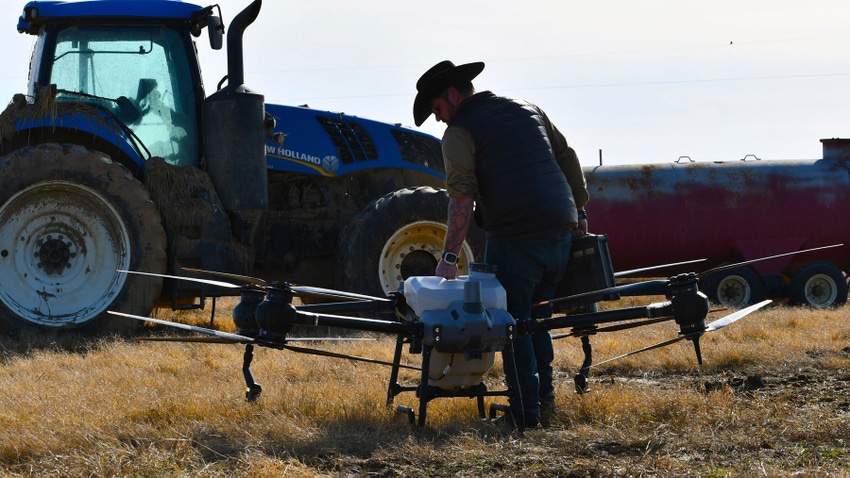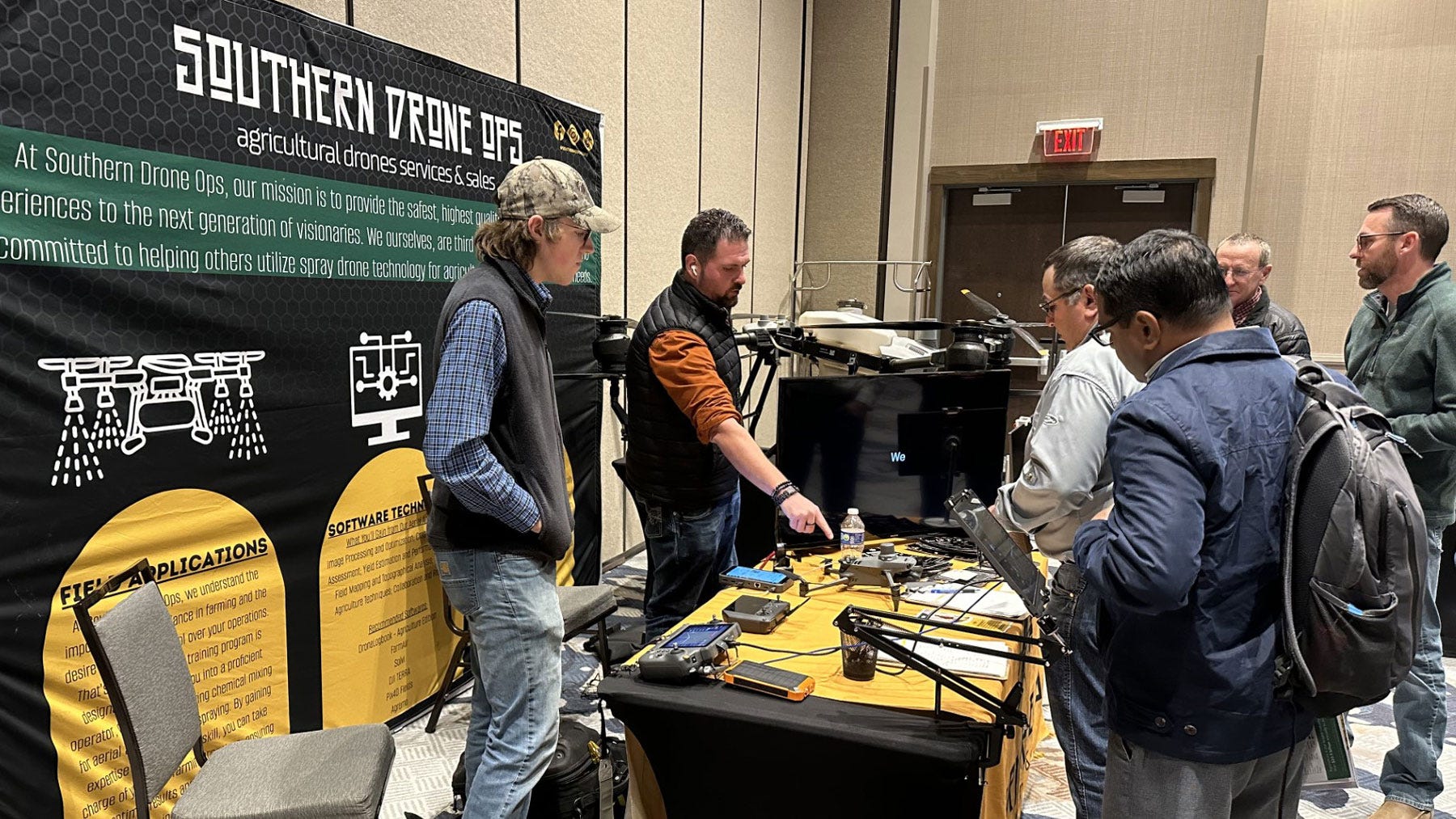
At a Glance
- Southern Drone Ops specializes in agricultural drones and is committed to helping drone pilots implement the technology.
- Cost savings compared to tractor spraying and ground rigs is a big reason farmers are turning to agricultural spray drones.
- Other benefits of using spray drones include reduced soil compaction and crop damage from the use of heavy machinery.
For Jonathan Cottingham, his deep-rooted passion for agricultural innovation goes beyond the land and takes to the sky. Raised in the Arkansas Delta, he grew up learning the traditional crop-dusting methods used by his father and grandfather. Today, Cottingham takes his aerial application experience to new heights by utilizing spray drone technology.
This interest in unmanned aerial vehicles (UAVs) took off in 2021 when Cottingham began exploring opportunities to use drones on the farm. Through insights and guidance from a longtime mentor, Cottingham established the company, Southern Drone Ops, and built a team specialized in agricultural spray drones committed to helping others implement the technology on their operations.
Since its establishment, Southern Drone Ops has expanded to offer a full line of DJI products in addition to an array of technical support to serve farmers, businesses, and community needs. The company has even partnered in projects with state and federal agencies and local municipalities to maximize the benefits of spray drone technology.
To share his vision and the benefits of using on-farm UAVs, Cottingham met with Farm Press and even gave us a drone demonstration from the turnrow.
Drone company goes above and beyond
While Southern Drone Ops is headquartered in Jonesboro, Ark., Cottingham and his team have seen the rapid adoption of drones across the country. This demand for innovation has grown Cottingham’s client base, with licensure to work in 11 states, and plans to further expand the business footprint.
Cottingham said, “Our mission is driven by a passion for transforming agriculture and empowering farmers to thrive in an everchanging industry, and our goal is to be licensed in all 50 states.”
The company specializes in customized drone packages aligned to meet the needs of an operation. The team helps farmers and aerial applicators select the best technology, from scouting drones to spray drones, along with the best fitting software to enhance their crop management efficiencies.
Consultation services offered through Southern Drone Ops provide in-depth training to help drone pilots get the most effective use of the technology. The team also helps aerial applicators navigate the required Federal Aviation Administration (FAA) paperwork and updates on regulatory changes.
“We offer hands-on, in-field consulting to ensure our customers are well-versed in every aspect of agricultural drone usage,” Cottingham said. “We have also conducted extensive research and fieldwork to develop a detailed guide addressing all the FAA Part 137 licensing and paperwork intricacies.”

Since its establishment three years ago, Southern Drone Ops has expanded to offer a full line of DJI products in addition to an array of technical support to serve farmers, businesses, and community needs. (Photo by Whitney Haigwood)
Investing in drone technology
When it comes to cost savings, Cottingham said the benefits of using spray drones are strikingly clear and a big reason that farmers are turning to the technology.
“For example, the DJI Agras T40 is capable of treating up to 50 acres per hour,” he noted. “That rapid coverage at a significantly lower expense is much more cost-effective compared to conventional spraying techniques.”
The minimal use of heavy machinery not only lowers fuel inputs but also reduces impacts like soil compaction and damage to crops known as tramline loss caused by tractor-driven spraying.
“Consider a farmer with a 1,000-acre cornfield, who has invested $100,000 in a traditional spray tractor and rig. The entire season’s cost using these traditional methods is around $115,000,” Cottingham proposed.
“In contrast, the same field treated with drone technology would cost approximately $43,000 – a remarkable $72,000 difference in operational-savings the first year,” he said.
When you also consider the prevented tramline loss in this scenario, the savings add up even more. Less physical impact from drone usage across the field means reduced crop damage and improved yield efficiency. Cottingham said this is a potential savings of $76,480.
With all these savings combined, the Southern Drone Ops team calculates an accumulated cost benefit of up to $400,000 over the course of four years attributed to the drone spraying transition in this 1,000-acre scenario.
Other benefits of on-farm drones
Another major benefit of utilizing drone technology comes from data insights that can enhance real-time decision making. Southern Drone Ops offers an array of software and training for programs like Pix 4D, Agromo, and Solvi to scout for weeds and compress images together.
Cottingham’s team also provides training for DroneLogbook, a software used by drone pilots to track flight location, chemicals, windspeed, and weather by location.
A dropped pin details flight information before takeoff to help applicators make informed decisions and reduce the chances of spray drift. DroneLogbook also logs flight records and allows pilots to generate reports as needed for compliance purposes.
The versatility offered by spray drones also opens options beyond traditional row crop applications.
Cottingham said, “There are so many applications with this technology. We can spray specialty crops, aquatics, water features, mosquito projects, right of ways, and forestry. Also drone spraying is really catching on in orchard management.”
These innovative possibilities continue to grow, and they are also sparking interest with the younger generation.
“One big thing about drones is the technology is interesting to the younger generation and is a way to funnel youth back into agriculture,” Cottingham said. “This is cool stuff. It is the stuff kids like to do and see. I think drones will encourage a whole new crop of youth interested in agriculture.”
Are you interested in learning more about drones for your farm? If so, check out the article on 4 Tips to Consider When Buying a Spray Drone.
About the Author(s)
You May Also Like






